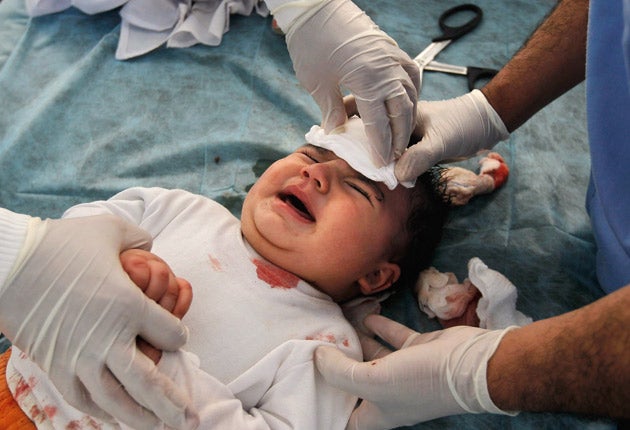Britain to fund evacuation of refugees from besieged Misrata

After rescue workers were forced to turn desperate refugees away from ships in rebel-held Misrata, the British government has stepped in to fund the evacuation of another 5,000 people from the besieged Libyan city.
The International Organisation of Migration, which has been organising the evacuation ships, took another 1,000 foreign workers and wounded Libyans out of Misrata yesterday. But, amid reports that EU military forces were ready to be deployed to secure aid supplies into the country, the IOM estimates that thousands more are still stuck in the port area, among them women and children, many living in the open without access to food, water or medicine.
"We wanted to be able to take more people but it was not possible," said Jeremy Haslam, who led the IOM mission, which has been going on for days but is still far from clearing the city of civilians. "Although the exchange of fire subsided while we were boarding ... we had a very limited time to get the migrants and Libyans on board the ship and leave."
Andrew Mitchell, the International Development Secretary, said yesterday that the UK would play a leading role in getting those left behind out of Misrata, which has become the scene of the most relentless Gaddafi assault in the country. Pro-Gaddafi forces have made serious incursions into the city in recent days, although the rebels were reported to have regained a small chunk of the centre yesterday.
"[The refugees] find themselves at terrible risk from incoming fire, with no way to get out," Mr Mitchell said on a visit to New York to discuss the aid mission at the United Nations. "These evacuations will take them to safety and help reduce the demand in Misrata for the very limited supplies of food, water and medical supplies available."
Migrant workers are reported to be converging on Misrata from nearby cities in the hope of escaping from the relentless bombardment. But in Benghazi yesterday Baroness Amos, the British head of the UN's humanitarian operation, admitted that, while Muammar Gaddafi's government had promised access for an aid mission during earlier talks in Tripoli, there had been no guarantee that attacks would cease in order to allow the delivery of supplies.
Libyan officials in Tripoli said that a humanitarian corridor would be set up but did not specify whether such a move would include a cessation of the violence which they characterise as defensive. Any EU force in Libya, even if designed simply to protect aid supplies, would represent a marked change in approach from the international coalition that is attempting to oust Col Gaddafi. No such force has yet been authorised by the UN. But British government sources said last night that proposals to arm the rebels had not gone away – so long as it could be done in such a way that would appear to comply with Resolution 1973.
They were sceptical about whether there was any realistic prospect of a new resolution, as mooted by French government officials at the end of last week. "We've pushed the Security Council as far as it's willing to go already," said one. "We think it is very unlikely that there will be a third resolution."
There is also pessimism over the prospects of resolving the impasse in Libya by finding a country that would be prepared to take Col Gaddafi. Reports at the weekend suggested that the allies were looking for a country in Africa which is not a signatory to the Rome Statute, and where he would be safe from extradition to face prosecution at the International Criminal Court.
A US diplomatic source said that any such deal would have to be acceptable to the rebel leadership in Benghazi. Mustafa Abdul-Jalil, chair of the Libyan Revolutionary Council, has discussed the matter with the Qatari authorities but did not have the authority to sanction any such move. Among the countries to have been informally sounded out are Chad and Mauritania.
Join our commenting forum
Join thought-provoking conversations, follow other Independent readers and see their replies
Comments
Bookmark popover
Removed from bookmarks